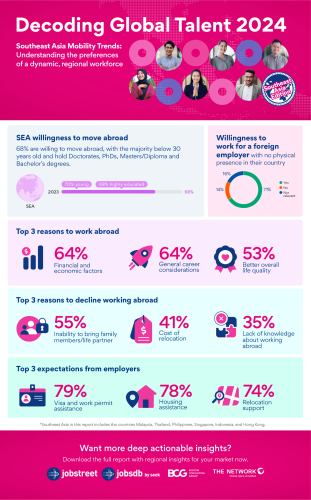The number of individuals willing to work remotely for foreign employers has increased significantly, reflecting a notable shift in how job seekers in Southeast Asia and Hong Kong approach employment opportunities.
The recently released Decoding Global Talent: Mobility Trends 2024 (SEA Edition) report by SEEK highlights this trend, with figures rising from 62% in 2020 to 71% in 2023.
This growing acceptance of remote work in 2023 surpasses the global average of 66%, demonstrating a changing perspective on international job opportunities. Notably, this willingness to work remotely exceeds the 68% of respondents who are open to physically relocating abroad for work.
SEEK, the parent company of the renowned online employment platforms JobsDB and JobStreet in Asia, conducted the research in collaboration with Boston Consulting Group, The Network, and The Stepstone Group.
Virtual mobility is on the rise.
Remote international work is becoming increasingly popular, offering jobseekers the significant advantage of pursuing more lucrative opportunities without the need to relocate.
According to 55% of talent in Southeast Asia and Hong Kong, the primary barrier to relocating overseas is the inability to bring family members. Malaysia (66%), Singapore (66%), and Hong Kong (68%), which place a high value on family unity and solidarity, are particularly notable for this sentiment.
Relocation costs also pose a significant obstacle for 41% of respondents, surpassing the global average of 30%. This concern is especially acute in Thailand (41%), the Philippines (42%), and Indonesia (44%). Other challenges include a lack of knowledge about working abroad (35%) and concerns about personal safety and security (31%).
Employers can use remote work as a solution.
The results suggest that employers, particularly in sectors facing talent shortages, may find remote work an appealing solution. By embracing virtual mobility, companies can tap into the growing talent pool in Southeast Asia and Hong Kong without requiring physical relocation.
Southeast Asia as a talent hub
Despite a decline in physical relocation trends since 2020, Southeast Asia continues to draw attention as a talent hub. Singapore, in particular, remains a highly desirable destination, with 30% of Malaysians preferring it for employment due to its reputation as a multicultural business hub. Singapore ranks ninth globally among the most desirable destinations for international talent.
Meanwhile, Malaysia has climbed the global rankings from 33rd in 2018 to 21st in 2023, reinforcing its appeal as a talent destination. Within Southeast Asia, Malaysia now ranks second.
Motivations for mobility
Economic pressures, including rising inflation, reduced wages, and limited career prospects, are driving talent from Southeast Asia and Hong Kong to seek opportunities abroad. For instance, talent from Indonesia increasingly pursues international experience to overcome the constraints of smaller domestic markets.
A slightly lower percentage (53%) of respondents from Southeast Asia and Hong Kong prioritise an enhanced quality of life compared to the global average of 55%.
Expectations from employers
Employers must provide substantial relocation support to attract and retain talent. Over 80% of Malaysian and Singaporean job candidates anticipate relocation assistance, including help with visas, work permits, and housing.
These figures are significantly higher than the regional average of 74% and the global average of 69%.
Additionally, 79% of Southeast Asian and Hong Kong talent expect visa and work permit support, aligning with the global average. Malaysia (86%), the Philippines (85%), and Singapore (84%) also exceed the global average of 69% in expecting housing assistance.
For further details on the Decoding Global Talent: Mobility Trends 2024 (SEA Edition) report, please refer to the following link: Decoding Global Talent 2024.

























